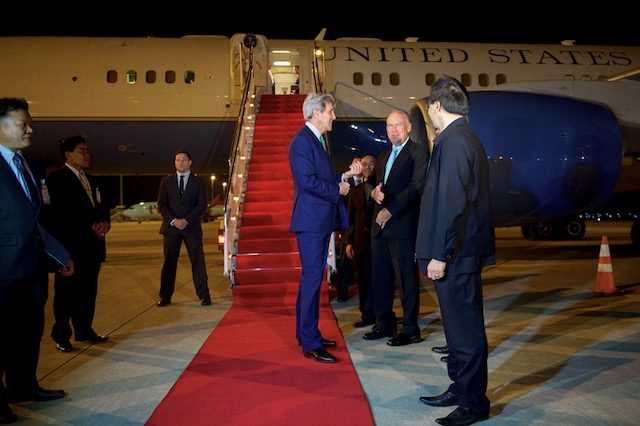SUMMARY
This is AI generated summarization, which may have errors. For context, always refer to the full article.

VIENTIANE, Laos – US Secretary of State John Kerry sat down Monday, January 25, to discuss the deadly legacy of unexploded American bombs in Laos and China’s influence in Southeast Asia during a high-profile visit to the reclusive communist state.
The trip to Vientiane also paves the way for a summit hosted next month by US President Barack Obama in California with the 10 leaders of the Association of Southeast Asian Nations (ASEAN).
Laos has assumed this year’s chairmanship of the regional bloc and will see a flurry of diplomatic activity culminating in an autumn visit by Obama – the first by a sitting US leader to the resource-rich but impoverished nation.
Kerry’s trip is only the third since 1955 by a US Secretary of State to a country carpet-bombed by America during the Vietnam War.
Welcoming America’s top diplomat in a cavernous room at his Soviet-era offices, Laos’ Prime Minister Thongsing Thammavong said the visit was a “landmark in… bilateral relations”.
Kerry, fresh from a trip to Saudi Arabia, hailed growing economic and security ties, as well as Laos’ chairmanship of ASEAN, as the “defining” issues of a new friendship.
Earlier, Kerry told reporters he would also discuss the removal of ordnance.
“We have been working on this project of clearing mines and undoing effects of war for a long time and it continues,” he said.
The US diplomat, who is due in Cambodia later Monday, arrives days after the 5-yearly congress of the Laos’ Communist Party, which chose 78-year-old vice-president Bounnhang Vorachith as its next leader.
The Communist Party has ruled since the end of the Vietnam War in 1975, tightly controlling the country of around 6 million.
50,000 deaths
Unexploded bombs across the region are the result of the massive US bombing campaign aimed at disrupting North Vietnamese supply routes through landlocked Laos.
It is “a problem, of course, that resulted from our actions in the Vietnam War in the ’70s”, the US State Department official conceded.
Those actions turned Laos into the most bombed nation in the world per capita, with more than 250 million bombs dumped on the country.
Around 30% failed to explode, including cluster munitions.
Around 50,000 people have been killed by leftover ordnance since the end of the war, with tens of thousands of others maimed, including children.
That grim legacy carries a particular resonance for Kerry, a decorated Vietnam war veteran wounded during combat.
In the intervening years relations between the two countries have often been hostile, with American support for ethnic Hmong anti-communist insurgents still raw in the memory of the Laos’ leadership.
Laos’ poor human rights record is also a sticking point, embodied by the 2012 disappearance of prominent activist Sombath Somphone, who was last seen on CCTV footage at a police checkpoint in Vientiane.
Kerry’s visit comes as the US deepens its courting of Southeast Asia, a region where Chinese heft is strong – particularly over small nations.
“Laos is a country like Cambodia, where China has been the dominant player both in economic and in political terms,” the State Department official said.
“So it’s significant that the Lao have – particularly in the last few years and certainly in 2015 – shown so much interest in strengthening and building relations with the United States.”
The Obama administration has made relations with Asia a diplomatic priority, in particular bolstering ASEAN as a counterpoint to Chinese regional power.
Several ASEAN states are embroiled in an increasingly bitter spat with China over disputed territory in the South China Sea.
The US says it takes no position on ownership of the various reefs and islets under dispute, but insists freedom of navigation in the vital shipping lane must be maintained. – Nicolas Revise, AFP / Rappler.com
Add a comment
How does this make you feel?
There are no comments yet. Add your comment to start the conversation.